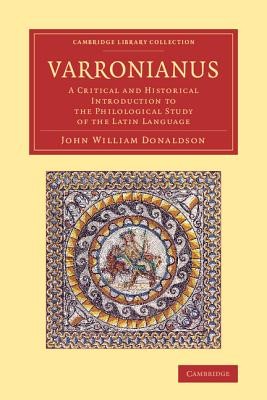
- We will send in 10–14 business days.
- Author: John William Donaldson
- Publisher: Cambridge University Press
- ISBN-10: 1108067077
- ISBN-13: 9781108067072
- Format: 15.2 x 22.9 x 1.8 cm, minkšti viršeliai
- Language: English
- SAVE -10% with code: EXTRA
Reviews
Description
John William Donaldson (1811-61), though somewhat unorthodox in his methods, was an important, if controversial, figure in the development of comparative philology. In this 1844 publication, he attempts to supply young English scholars of Latin with an introductory guide to Latin philology by outlining the origins of the Roman people and, through this, explaining the foundational structures of the Latin language and how they gave rise to Classical Latin. Epigraphic evidence, drawn from the Twelve Tables in particular, is examined as part of the enquiry into Old Latin, and other Italic languages such as Umbrian, Oscan and Etruscan are considered as part of the development of a more standardised Latin language. Although many of the conclusions Donaldson draws are based on limited evidence, the book remains an interesting specimen of early comparative philology. His earlier work on Greek, The New Cratylus (1839), is also reissued in this series.
EXTRA 10 % discount with code: EXTRA
The promotion ends in 23d.04:04:45
The discount code is valid when purchasing from 10 €. Discounts do not stack.
- Author: John William Donaldson
- Publisher: Cambridge University Press
- ISBN-10: 1108067077
- ISBN-13: 9781108067072
- Format: 15.2 x 22.9 x 1.8 cm, minkšti viršeliai
- Language: English English
John William Donaldson (1811-61), though somewhat unorthodox in his methods, was an important, if controversial, figure in the development of comparative philology. In this 1844 publication, he attempts to supply young English scholars of Latin with an introductory guide to Latin philology by outlining the origins of the Roman people and, through this, explaining the foundational structures of the Latin language and how they gave rise to Classical Latin. Epigraphic evidence, drawn from the Twelve Tables in particular, is examined as part of the enquiry into Old Latin, and other Italic languages such as Umbrian, Oscan and Etruscan are considered as part of the development of a more standardised Latin language. Although many of the conclusions Donaldson draws are based on limited evidence, the book remains an interesting specimen of early comparative philology. His earlier work on Greek, The New Cratylus (1839), is also reissued in this series.


Reviews